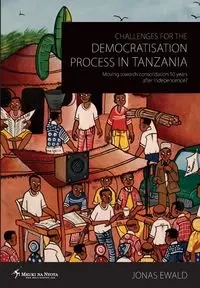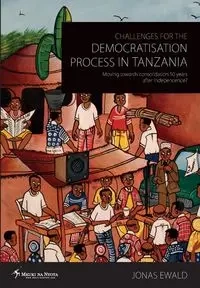Challenges for the Democratisation Process in Tanzania. Moving Towards Consolidation Years After Independence? - Jonas Ewald
Challenges for the Democratisation Process in Tanzania. Moving Towards Consolidation Years After Independence? - Jonas Ewald
AutorzyJonas Ewald
EAN: 9789987082506
Symbol
077FNV03527KS
Rok wydania
2013
Elementy
376
Oprawa
Miekka
Format
17.0x24.4cm
Język
angielski

Bez ryzyka
14 dni na łatwy zwrot

Szeroki asortyment
ponad milion pozycji

Niskie ceny i rabaty
nawet do 50% każdego dnia
Niepotwierdzona zakupem
Ocena: /5
Symbol
077FNV03527KS
Kod producenta
9789987082506
Rok wydania
2013
Elementy
376
Oprawa
Miekka
Format
17.0x24.4cm
Język
angielski

Tanzania has been independent in 2011 for 50 years. While most neighbouring states have gone through violent conflicts, Tanzania has managed to implement extensive reforms without armed political conflicts, Hence, Tanzania is an interesting case for Peace and Development research. This dissertation analyses the political development in Tanzania since the introduction of the multiparty system in 1992, with a focus on the challenges for the democratisation process in connection with the 2000 and 2005 elections. The question of to what extent Tanzania had moved towards a consolidation of democracy, is analysed by looking at nine different institutions of importance for democratisation grouped in four spheres: the state, the political, civil and economic society. Focus is on the development of the political society, and the role of the opposition in particular. The analysis is based on secondary and primary material collected between September 2000 to April 2010. The main conclusion is that even if the institutions of liberal democracy have gradually developed, in practice single-party rule has continued, manifested in the 2005 election when the CCM won 92% of seats. Despite impressive economic growth, poverty remains deep and has not been substantially reduced. On a theoretical level this brings the old debate between liberal and substantive democracy back to the fore. Neither the economic nor the political reforms have brought about a transformation of the political and economic system resulting in the poor majority gaining substantially more political influence and improved economic conditions. Hence, it is argued that the interface between the economic, political and administrative reforms has not been sufficiently considered in the liberal democratic tradition. Liberal democracy is necessary for a democratic development, but not sufficient for democracy to be consolidated. For that a substantive democratic development is necessary.
EAN: 9789987082506
EAN: 9789987082506
Niepotwierdzona zakupem
Ocena: /5
Zapytaj o produkt
Niepotwierdzona zakupem
Ocena: /5
Napisz swoją opinię

